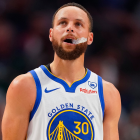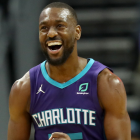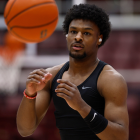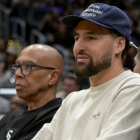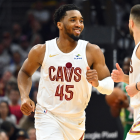At All-Star Weekend in New Orleans in 2008, then-Boston Celtics star Paul Pierce saw P.J. Brown walking on Canal Street. Pierce was in his car, and he stopped to recruit the free agent.
“He was hollering out the window saying, ‘P.J., we need you,’” Brown said, via the Boston Globe. “He was with a couple of his boys going somewhere. He let down the window and said, ‘C’mon, man, come to Boston, we need you.’ I said, ‘I hear you, man.’ I shook his hand out the window and kept going. He was in the middle of the street. I just let him go.”
The next night, Pierce and fellow All-Star Ray Allen pitched the 38-year-old at the National Basketball Players Association party. Brown hadn’t played in nine months, semi-retired after a season with the Chicago Bulls, but he decided he wanted to sign with the Celtics. In May, he hit what he called “the biggest shot of my career,” a 21-foot jumper to give Boston a three-point lead late in the fourth quarter of Game 7 against the Cleveland Cavaliers. When the shot went in, ABC commentator Mike Breen exclaimed that he was an “unlikely hero.”
On June 17, the Celtics won their 17th title. Brown retired a champion, and he will always be remembered fondly in Boston. So will Sam Cassell, who did not have the same impact but also joined the Celtics midseason after reaching a buyout agreement with the Los Angeles Clippers.
After strengthening its bench this way, Boston tried again the next season with Stephon Marbury, who was bought out by the New York Knicks in February 2009. Marbury, however, never adjusted to life as a backup with the Celtics and played the worst basketball of his NBA career. He went to China the following season, never to return.
The Marbury failure didn’t discourage Boston. In 2010, it signed Michael Finley after the San Antonio Spurs bought him out. Finley shot 25 percent in the playoffs and then retired at 37 years old. The Celtics signed Sasha Pavlovic, Troy Murphy and Carlos Arroyo in 2011; Ryan Hollins in 2012 and Terrence Williams, Shavlik Randolph and D.J. White in 2013 -- not a P.J. Brown in the bunch. Since then, Celtics president Danny Ainge has completely avoided the buyout market.
“Listen, when I was here and we had those runs, I’m in the general manager’s office, and I had my coaches coming in and going, ‘We need this’ or ‘We heard this guy, this veteran guy [is available],’” Ainge told 98.5 The Sport Hub’s Toucher and Rich last week. “So we went and did these buyouts every year to try to help our team, and rarely did those work. Rarely.
“It sounds good on paper. Everybody said, ‘Oh my gosh, they just added so-and-so to the team,’ when, in fact, those players may take away minutes from a younger player that is better, change the chemistry and the roles of the players inside your organization.”
If you look at the history of midseason additions, it quickly becomes clear that Ainge’s experience is not unusual. Generally, the players who take buyouts are past their prime, flawed or otherwise unable to fix the major problems plaguing the teams they join. Here’s an almost-exhaustive accounting of this, starting with the year that Brown and Cassell chose Boston:
2008
- Celtics sign P.J. Brown
- Celtics sign Sam Cassell
- Spurs sign Damon Stoudamire
- Mavericks sign Tyronn Lue
- Pistons sign Theo Ratliff
- Pacers sign Ronald “Flip” Murray
Notes: Stoudamire was unable to supplant Jacque Vaughn as the Spurs’ backup point guard, and his short stint in San Antonio was the end of his playing career. Cassell shot 38.5 percent in the regular season and 33.3 percent in the playoffs as a Celtic.
2009
- Celtics sign Stephon Marbury
- Cavaliers sign Joe Smith
- Nuggets sign Jason Hart
- Heat sign Luther Head
- Suns sign Stromile Swift
- Spurs sign Drew Gooden
Notes: Swift joined the Suns after Amar’e Stoudemire suffered a season-ending eye injury. They failed to qualify for the playoffs, and Swift never played in another regular-season game. For Gooden, the Spurs were his sixth team in seven years, and while he had some nice games for them in April, he did not earn coach Gregg Popovich’s trust in the playoffs.
2010
- Blazers sign Travis Diener
- Celtics sign Michael Finley
- Bucks sign Jerry Stackhouse
- Bobcats sign Larry Hughes
Notes: Hughes shot 32.7 percent in Charlotte. When he signed, the website “Hey Larry Hughes, Please Stop Taking So Many Bad Shots” welcomed Bobcats fans. Diener barely played for the Blazers and signed in Italy the following summer, where he would spend four years before retiring.
2011
- Grizzlies sign Jason Williams
- Knicks sign Jared Jeffries
- Knicks sign Derrick Brown
- Celtics sign Troy Murphy
- Heat sign Mike Bibby
- Bulls sign Rasual Butler
- Celtics sign Sasha Pavlovic
- Mavericks sign Corey Brewer
- Warriors sign Al Thornton
- Celtics sign Carlos Arroyo
- Grizzlies sign Leon Powe
Notes: Williams, Thornton, Arroyo and Powe all finished their NBA careers that season. Bibby totally torpedoed the Heat’s defense, but coach Erik Spoelstra stuck with him in the playoffs even when he had the worst PER of all-time.
2012
- Magic sign Ish Smith
- Clippers sign Kenyon Martin (China)
- Jazz sign DeMarre Carroll
- Knicks sign J.R. Smith (China)
- Spurs sign Patty Mills (China)
- Nuggets sign Wilson Chandler (China)
- Hornets sign Chris Johnson
- Grizzlies sign Gilbert Arenas
- Heat sign Ronny Turiaf
- Thunder sign Derek Fisher
- Celtics sign Ryan Hollins
- Spurs sign Boris Diaw
Notes: This was an anomaly because of the lockout -- Chandler was a restricted free agent, and the Spurs struck gold by adding Mills and Diaw, who was out of shape and disinterested in Charlotte. Ronny Turiaf won a title in Miami, but while he was absolutely an upgrade over Dexter Pittman and Eddy Curry, he didn’t play a meaningful minute in the NBA Finals. Memphis was Arenas’ last NBA stop, and he barely played for the Grizzlies in the playoffs.
2013
- Heat sign Chris Andersen
- Knicks sign Kenyon Martin
- Thunder sign Derek Fisher
- Celtics sign Terrence Williams
- Hornets sign Lou Amundson
- Celtics sign Shavlik Randolph (China/Puerto Rico)
- Celtics sign D.J. White (China)
Notes: Miami bolstered its front court a second year in a row by signing the 34-year-old Birdman, who had knee surgery the previous July and was cut by the Nuggets. Oklahoma City couldn’t get enough of the 38-year-old Fisher, who asked the Mavericks to waive him in December of that season when he strained his patellar tendon, saying he wanted to be with his family. Boston turned out to be the end of Williams’ NBA career, and White only played two games after this season.
2014:
- Pacers sign Andrew Bynum
- Pelicans sign Luke Babbitt (Russia)
- Nets sign Jason Collins
- Clippers sign Glen Davis
- Grizzlies sign Beno Udrih
- Wizards sign Drew Gooden
- Clippers sign Danny Granger
- Thunder sign Caron Butler
- Bulls sign Jimmer Fredette
- Knicks sign Shannon Brown
Notes: Bynum only played twice for the Pacers and has not been heard from since, but his presence reportedly messed with Roy Hibbert and contributed to the team’s decline in the second half of the season. Granger was effectively done. The Gooden signing was probably the best of the bunch, but the move didn’t truly pay off until he transformed into a stretch 4 during the 2015 playoffs.
2015
- Mavericks sign Amar’e Stoudemire
- Cavaliers sign Kendrick Perkins
- Heat sign Michael Beasley (China)
- Timberwolves sign Justin Hamilton
- 76ers sign Glenn Robinson III
- Pelicans sign Toney Douglas (China)
- Nuggets sign Ian Clark
Notes: This is just two years ago, and nobody is still with the same team. Perkins’ career might be over unless the Thunder bring him back, and Stoudemire is playing in Israel.
2016
- Mavericks sign David Lee
- Bucks sign Steve Novak
- Nuggets sign JaKarr Sampson
- Warriors sign Anderson Varejao
- Wizards sign J.J. Hickson
- Heat sign Joe Johnson
- Hawks sign Kris Humphries
- Raptors sign Jason Thompson
- Grizzlies sign Ryan Hollins
- Rockets sign Michael Beasley (China)
- Thunder sign Nazr Mohammed
- Pacers sign Ty Lawson
- Spurs sign Andre Miller
- Spurs sign Kevin Martin
- Suns sign Chase Budinger
- Wizards sign Marcus Thornton
- Rockets sign Andrew Goudelock (China)
- Clippers sign Jeff Ayres
Notes: Humphries is the only guy who has stuck, as Varejao and Novak were both waived this season and Thornton was moved at the trade deadline. It should be noted that Varejao did wind up playing in the Finals, but Warriors fans would rather not be reminded of this fact.
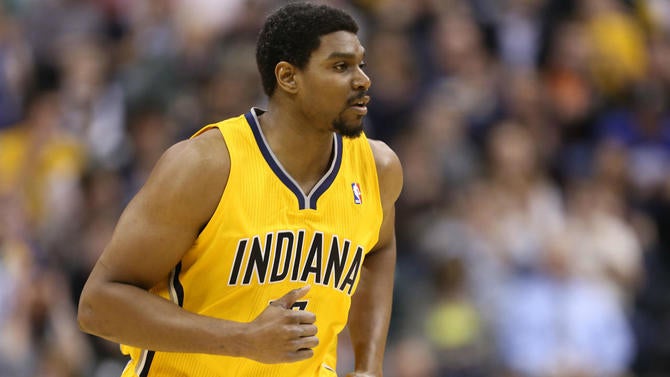
The fact that the vast majority of midseason signings are inconsequential doesn’t mean that they’re never worth doing. The defending champion Cleveland Cavaliers, for example, have been looking for ways to improve their bench all season, and they should be applauded for managing to sign center Andrew Bogut and guard Deron Williams, who were both waived by the Dallas Mavericks. Their main rival, the Golden State Warriors, acted logically in signing Matt Barnes after star forward Kevin Durant got injured.
In fact, just a few days after explaining his reluctance to explore the buyout market, Ainge found himself on the phone with Bogut, per the Boston Globe. The Celtics could have used his defense and rebounding as they try to challenge the Cavs in the East.
We’ll never know if Bogut might have been Boston’s next P.J. Brown. History tells us, though, that most of the recent player movement around the league will be forgotten in a year or two.










